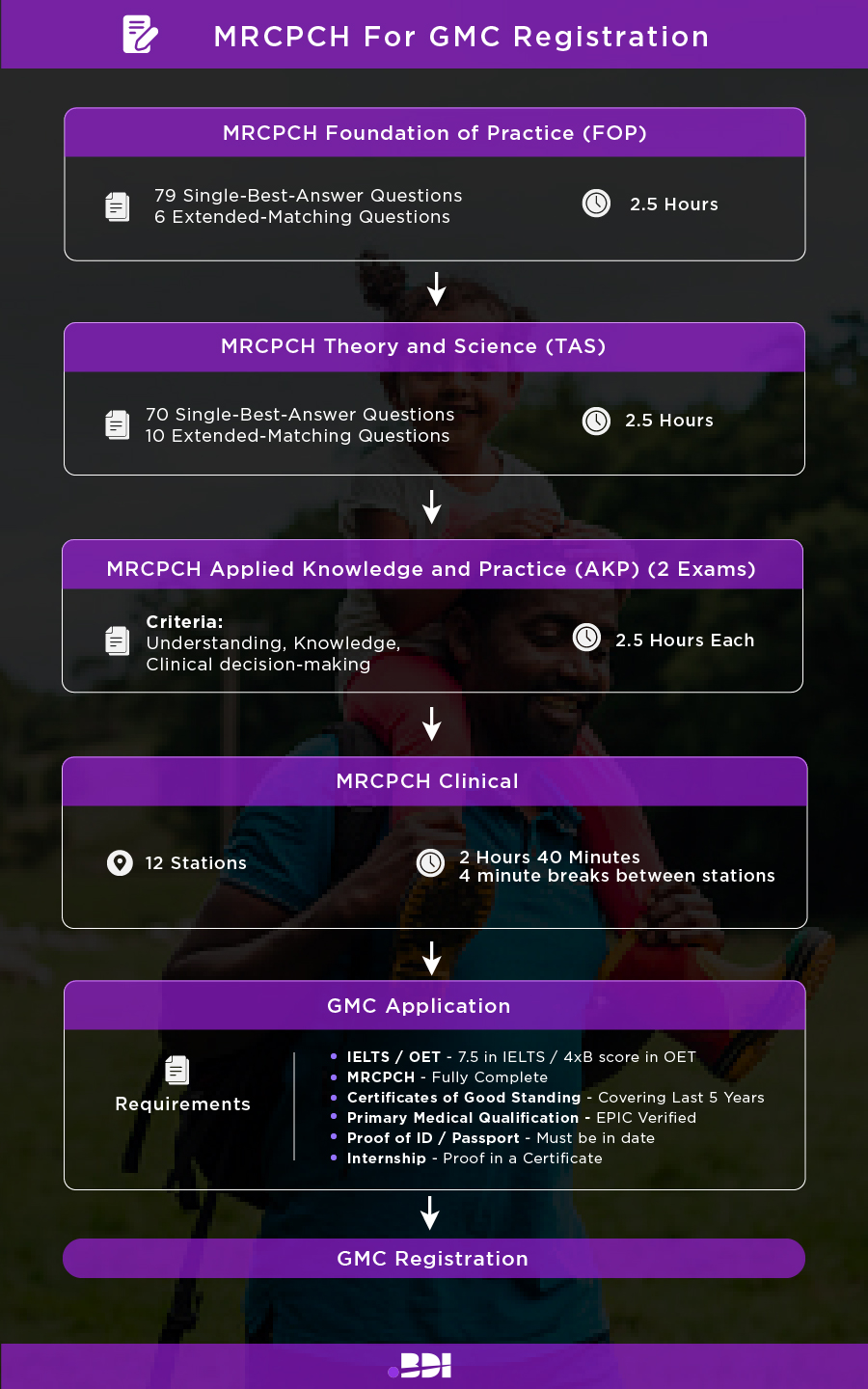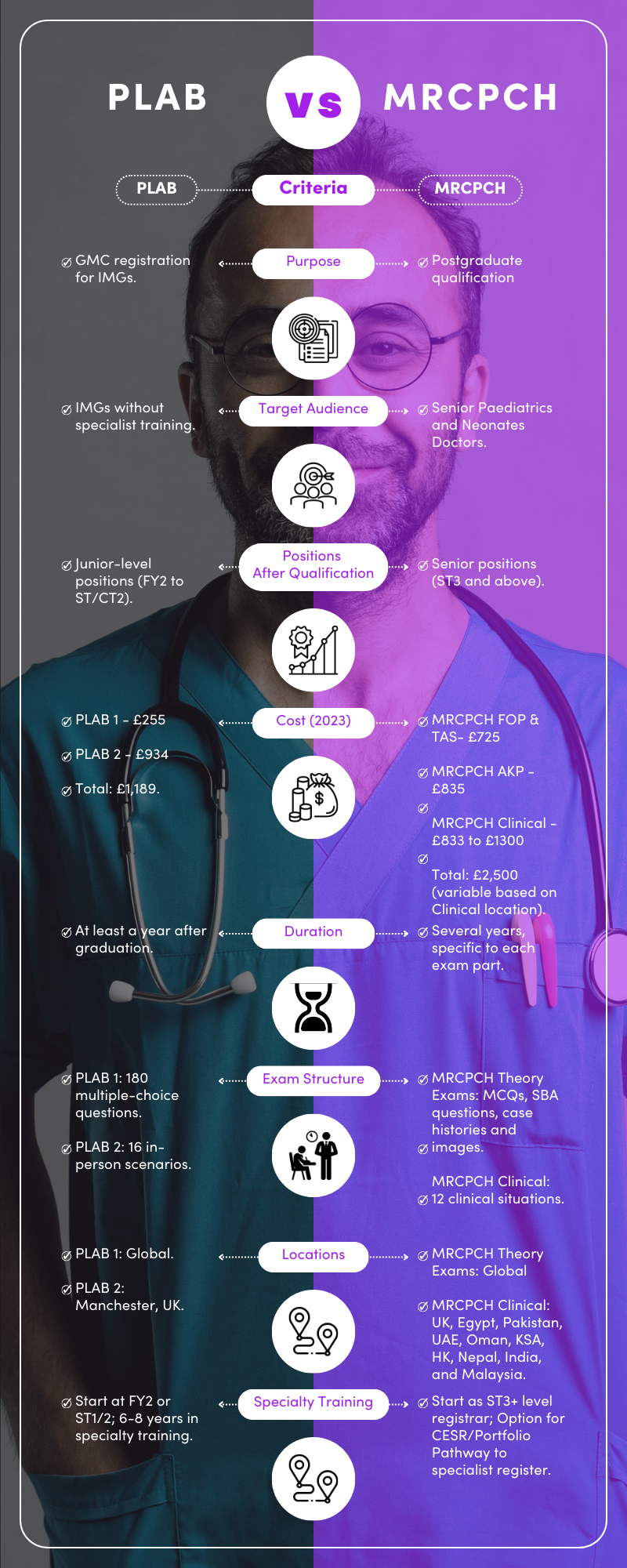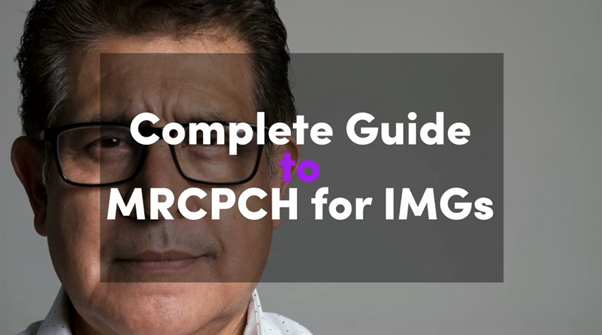MRCPCH for GMC Registration
02 Mar, 20239 Minutes
Every international medical graduate must register with the General Medical Council (GMC) to legally practise medicine in the UK. Without GMC registration, you cannot work in any NHS or private healthcare facility in the country.
The good news is there are many potential routes to securing GMC registration, which will allow you to enjoy all the benefits of working for the NHS, such as a high-paying salary, ample career opportunities, and various job perks.
If you would like to enter ST3 or ST4 training to become a qualified paediatrician in the UK, you must pass the internationally recognised MRCPCH exams. Find out more about MRCPCH for GMC registration.
What is MRCPCH? An Overview
The MRCPCH exams are a postgraduate route for international doctors and medical students seeking GMC registration. The three theory exams and clinical exam are based on the latest research and evidence, ensuring a candidate meets the GMC’s required medical standards.
To attain full MRCPCH, you must pass the following:
- Foundation of Practice (FOP) - a theory exam
- Theory and Science (TAS) - a theory exam
- Applied Knowledge in Practice (AKP) - a theory exam
- MRCPCH Clinical Exam – a multi-station exam in a hospital setting
MRCPCH candidates can take three computer-based theory exams in any order, but they must pass each one before moving on to the MRCPCH clinical exam.
MRCPCH Cost and Eligibility
The cost for each MRCPCH theory and clinical exam varies and depends on whether you sit an exam in the UK or overseas.
For instance, the FOP and TAS exams will cost £350 each, but overseas candidates will pay £435 - or you can pay a combined fee of £595 for both exams (the UK) or £725 (outside the UK). Also, the APK will cost £595 for its two papers in the UK or £835 overseas. Once you’re ready for the clinical exam, you can expect to pay £833 in the UK, but you may pay much more overseas, such as £1,115 in Nepal and Myanmar and £1,555 in India.
Bear in mind, the exam cost prices are subject to change each year. Also, if you plan to travel to the UK to take an MRCPCH exam, you must factor in the cost of travel, accommodation, and visas.
If you fail one or more exams, you must pay the same fee to retake them. However, you will be rewarded with a fantastic NHS career with a high-paying salary once you have passed the exams and acquired GMC registration.

How to Apply for MRCPCH Exams
The MRCPCH exams are available three times per year and can be taken at a test centre or your home or workplace with online invigilation. You must create an RCPCH account and complete a quick form to prove you are eligible to register for the exams.
For example, you must have a Primary Medical Qualification (PMQ) to register for the MRCPCH theory exams, and you must complete the three theory exams to register for the MRCPCH clinical exam. Once you have proved your eligibility, you can apply to sit an exam during an upcoming application period.
MRCPCH Theory Exams
The computer based MRCPCH theory exams are available three times per year, and you can take them in any order. Unless additional time is approved, each theory exam is two hours and 30 minutes.
The Foundation of Practice (FOP) Theory Exam
Originally known as the MRCPCH Part 1a, the Foundation of Practice theory exam will assess your current knowledge, understanding, and decision-making. The exam will last two hours and thirty minutes and features 79 SBA questions and six extended matching questions (EMQ).
Theory and Science (TAS) Theory Exam
Once known as the MRCPCH Part 1b, the Theory and Science theory exam is designed to gain insight into your evidence-based practice and basic scientific, pharmacological, and physiological principles. Like FOP, the exam will take two hours and thirty minutes to complete and is likely to feature 10 EMQ and 70 SBA questions.
Applied Knowledge in Practice (AKP)
The Applied Knowledge in Practice includes two exams that will each take two hours and thirty minutes to complete. You will be assessed on your understanding, knowledge, and clinical decision-making. Also, the theory exams will feature N of Many questions, case histories, and photographic data material interpretation.
If preferred, you can take the FOP and TAS exams on the same day or separate days. As the AKP consists of two papers, you must complete the exams on the same day.
MRCPCH Clinical Exam
After passing the above theory exams, you can apply for the MRCPCH Clinical Exam. Its purpose is to prove you have the appropriate clinical standards required of ST4 candidates in paediatrics.
The clinical exam is held at a hospital, and candidates should ideally have two and a half years of training from their graduation date, which includes:
- 12 months of emergency paediatric care
- Six months experience as a house paediatrician
During the clinical exam, you will rotate 12 stations that will each feature an examiner, and it will take approximately 2 hours and 40 minutes to complete. Before you worry about the exam intensity, it might be a relief to learn there are four-minute breaks between each station.
Preparing for the MRCPCH Exams
The MRCPCH exams will not only identify if you’re a safe and knowledgeable paediatrician, but they require you to answer an examiner’s questions correctly, which might not always match your clinical practice observations.
In addition to reading various textbooks to prepare for the exam, you must recognise patterns throughout the exam to pass. The same areas may disproportionately crop up but may provide insight into how to answer the questions.
Cover all bases when preparing for the exam, which means studying subjects you enjoy and those you find uninteresting. Some candidates find it helpful to create a revision timetable to ensure they allocate the same amount of time to every area of the curriculum. You may be able to join study groups with other people taking the exams – so that you have someone to study and practise with.
Should you go for MRCPCH or PLAB?
If you've read this far and you're not sure if MRCPCH is the right route for you then why not check out your alternative option - PLAB. We've created this compare and contrast guide to PLAB Vs MRCPCH for Paediatrics and this infographic will help you with the headlines:

What Happens After You Complete MRCPCH?
Once you have passed the MRCPCH theory exams and clinical exam, you can use the internationally recognised postgraduate qualification to secure GMC registration. Your results will be ready and waiting for you between six to seven weeks after completing each exam.
UK trainees can enter ST3 training once they have passed at least two of three theory exams. However, candidates must have passed every MRCPCH exam, including the clinical exam, to enter ST4 training.
If you’ve completed your MRCPCH and are ready to relocate to the UK then contact us and we’ll be able to help with the latest Paediatrics job vacancies, CV templates and interview preparation guides.


